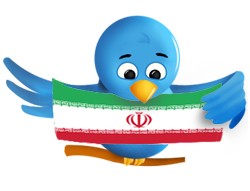 London-based NGO Small Media, a self-described "action lab helping the free flow of information and creative expression in closed societies, with training, technology and research initiatives that focus on Iran", has published a report on the use of social media by Iran's Presidential candidates.
London-based NGO Small Media, a self-described "action lab helping the free flow of information and creative expression in closed societies, with training, technology and research initiatives that focus on Iran", has published a report on the use of social media by Iran's Presidential candidates.
The report, covering 21-27 May, concludes that the "prevailing attitude is quite negative [about the election] among those on Twitter".
Small Media found that former President Hashemi Rafsanjani was the person most "worth following" on Twitter, despite his disqualification by the Guardian Council almost a week earlier.
Saeed Jalili, the Secretary of the Supreme National Security Council, was the subject of the most tweets; however, only 21% of the communication was positive.
Reformist candidate Mohammad-Reza Aref was the least discussed with only 331 tweets, 59% of which were deemed "neutral". On the positive side, Aref --- frequently compared to Mostafa Moein, the main reformist candidate in the 2005 election, had no negative Twitter communication and a slight surge in numbers "liking" his Facebook page.
The most popular candidate, with 63% "positive" tweets was the moderate Hassan Rouhani. "Rowhani" --- an English variant of the surname --- was also second to "Iran" as the most frequently tweeted word in the Iranian election discussion.
[Editor's Note: The report probably under-estimated Rouhani's prominence on social media. It only appears to consider the spelling "Rowhani" and not "Rouhani" or "Rohani".]
The candidate with the most negative tweets was leading MP Gholam-Ali Haddad-Adel, with more than half expressing disapproval. The most re-tweeted post about the candidate was: "Media frenzy says: 'Political backbenchers are useless, Haddad-Adel is useless'."
The least-known of the candidates, Mohammad Gharazi, seems to have had a late surge in support, judging from the sudden increase in his unofficial (because of the Iranian ban) Facebook page --- it doubled in followers between 21 and 27 May.